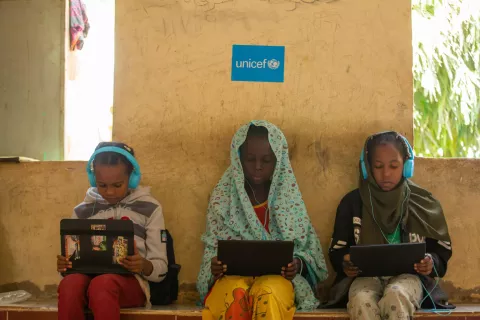UNICEF Executive Director Henrietta Fore's remarks at the Conference on Sustaining Support for the Rohingya Refugee Response
Checked against delivery

NEW YORK, 22 October 2020 – “On behalf of UNICEF, we thank the organizers and donors who are shining a light on the challenges faced by Rohingya children and women. Inside and outside Myanmar.
“Three years ago, in what was perhaps the darkest days of their young lives, hundreds of thousands of Rohingyas fled Rakhine State to Cox’s Bazar.
“Their journey was dangerous. Some lost family along the way.
“Their arrival was clouded by uncertainty — with no immediate access to safe water, sanitation, health care, or education.
“With thanks to the Government of Bangladesh — and the extraordinary generosity of donors worldwide — UNICEF and our partners like UNHCR, IOM, WFP and many NGOs continue to serve and support these children.
In addition to providing vital services such as health, nutrition, WASH and protection — our teams are also rallying behind their education.
“Education is critical for young Rohingyas to build better futures. And to one day voluntarily return and reintegrate into Myanmar with the safety and dignity they deserve.
“By September of 2019, nearly 90 per cent of Rohingya refugee children of primary school-going age were regularly attending a learning facility.
“In January, the Government of Bangladesh also approved the pilot use of Myanmar’s national curriculum for Rohingya children and the resumption of internet connectivity to the camps. A huge benefit that puts internet-based education — or “EdTech” — in the hands of these eager young learners.
“While COVID-19 disrupted this progress, and closed all learning centres in the camps and schools across Bangladesh, UNICEF and our partners are doing all we can to provide education remotely.
“We’re giving parents and caregivers the training and tools they need to support their children’s education. More than 170,000 Rohingya children are being supported this way. And in parallel, we’re working with the government to safely open learning centres and schools when the conditions are right.
“Inside Myanmar, although some Rohingya children are still receiving some form of education support, the quality and continuity is lacking. And while UNICEF has been working to expand both formal and alternative pathways to education — while also delivering other vital services — the arrival of COVID-19 has dramatically raised the stakes for these young learners.
“All Rohingya children need the global donor community to rally behind their futures. And they need it now.
“Help our agencies provide sustainable education for all Rohingya children, adolescents and youth — both formal and alternative instruction, no matter where they live, now and beyond COVID-19.
“Join our call to ensure a place for Rohingya children in both countries’ education systems and programmes. They need education where they live.
“Support UNICEF and UNHCR’s joint blueprint for action to create a “fair deal” for refugees. We must accelerate our joint work not only in education, but all the areas in which these children need help. From water and sanitation, to child protection and psychosocial counselling.
“And finally — let us not forget the daily struggles of Rohingya children who remain inside Myanmar. They’re still facing discrimination, horrifying violence and intensifying conflict every day. The fighting needs to stop so children can return to school and play, and so refugees can return home safely if they choose.
“There is no time to waste. Every month that goes by is a missed opportunity for these young learners, and for a peaceful, inclusive future. Let’s rally behind Rohingya children, and stand with them as they build the futures they deserve.”
#####




